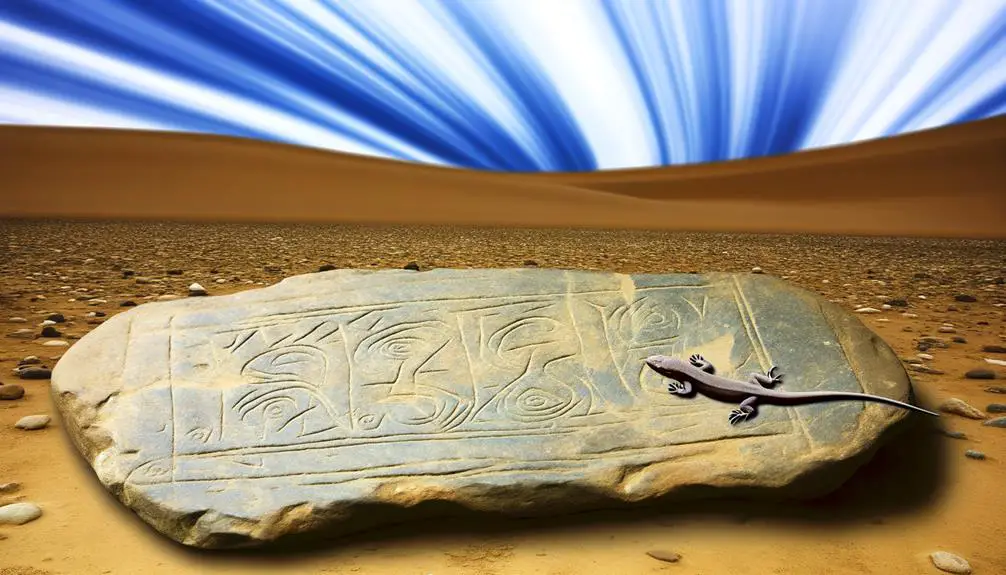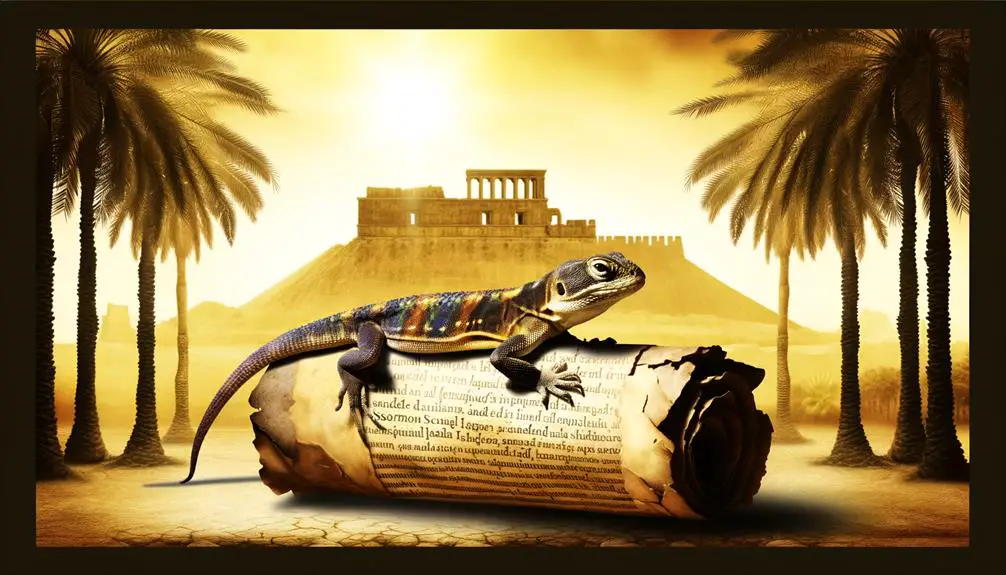Navigate the nuanced mention of lizards in the Bible, uncovering hidden symbols and lessons in ancient texts.

Lizard in the Bible
Just like a lizard can slip through cracks and crevices almost unnoticed, references to lizards in the Bible might surprise you with their subtle presence and significance.
You're about to uncover why these seemingly insignificant creatures are mentioned among the unclean animals in Leviticus and what lessons Proverbs draws from their behavior.
The symbolism and meanings behind these references are more profound than you might initially think, hinting at layers of interpretation that invite further exploration.
Let's embark on this journey together, where each verse reveals a new dimension to the ancient text, offering insights that are as relevant today as they were centuries ago.
Key Takeaways
- Lizards in the Bible symbolize impurity but also teachings on adaptability and wisdom.
- Biblical texts categorize lizards as unclean, reflecting dietary and spiritual laws of the time.
- Lizard symbolism varies, representing traits like resilience, observation, and humility.
- Exploring lizard references offers lessons on embracing change and using insights for meaningful outcomes.
Biblical References to Lizards

In the rich tapestry of biblical texts, lizards appear as creatures symbolizing both impurity and cunning, offering a unique lens through which to explore ancient perceptions and teachings. You'll find that the Bible references various lizard species, though not always by the names you're familiar with today. These references aren't merely incidental; they're woven into the broader narrative to embody specific traits or moral lessons, reflective of the geographic locations and the ecosystems familiar to the biblical authors.
The specific species mentioned and their geographic locations provide insight into the natural history of the Near East. For instance, the mention of the 'koach' (Leviticus 11:30), often translated as a large lizard or monitor lizard, illuminates the biodiversity of the regions mentioned in biblical texts. These lizards, native to the arid environments of the Middle East, were well-known to ancient peoples, who observed their behaviors and incorporated them into their spiritual and moral frameworks.
Analyzing these references, you're invited to consider not just the biological diversity of the ancient world but also how these creatures were perceived within their respective cultural and ecological contexts. The Bible's authors drew from their surroundings to enrich their narratives, using the characteristics and habits of local fauna, including lizards, to communicate deeper truths.
Thus, when you delve into the scripture's mention of lizards, you're engaging with an ancient tradition that blends keen observation of the natural world with profound spiritual insights. It's a testament to the interconnectedness of all life and the myriad ways in which the natural world influences human thought and spirituality.
Lizards as Unclean Animals

The Bible categorizes lizards as unclean animals, a designation that carries profound implications for understanding ancient dietary laws and symbolic purity. This classification isn't merely about what's for dinner; it's deeply woven into the cultural perceptions and spiritual practices of the time.
By deeming lizards unclean, the Scripture provides a clear boundary between the creatures that may enter the human diet and those that must be avoided. This distinction highlights a broader, symbolic division between purity and impurity, sanctity and profanity. It's a demarcation that goes beyond physical health, touching the spiritual well-being of the community.
To give you a clearer picture, consider these points:
- *Lizards, by their nature, often dwell in crevices and unseen places, which could contribute to their association with uncleanliness and, by extension, impurity.*
- *The dietary laws, including prohibitions against consuming lizards, were integral in setting the Israelites apart from neighboring cultures, reinforcing a unique identity.*
- *These laws served not only as health guidelines but also as daily, tangible reminders of the covenant between God and His people.*
- *Understanding the unclean status of lizards in the Bible helps modern readers grasp the ancient worldview that saw spiritual significance in everyday actions, including eating.*
- *The categorization reflects broader cultural perceptions of animals, which were often seen as symbols carrying deeper meanings.*
In this context, lizards represented more than just reptiles; they were part of a complex system that governed spiritual purity, community health, and cultural identity.
Symbolism and Meanings

Beyond their physical presence, lizards carry a multitude of symbolic meanings within biblical texts, reflecting a deep intertwining of natural elements with spiritual insights. In the scriptures, these creatures often serve not just as representations of the natural world but as vehicles for conveying deeper, spiritual truths. Lizard metaphors, for instance, provide a rich tapestry for scholars and believers alike to explore the complex relationship between humanity, divinity, and the animal kingdom.
You'll find that in biblical symbolism, lizards can embody aspects of adaptability and survival. Their ability to thrive in harsh environments and remain inconspicuous offers a spiritual parallel to the resilience and discretion advised in navigating one's faith journey. This adaptability symbolizes the necessity of spiritual flexibility in the face of life's trials.
Moreover, the cultural interpretations of lizards in biblical times add layers of meaning to their mention. In some cultures, lizards were seen as creatures possessing wisdom due to their keen eyesight and the ability to stay still for long periods, observing their surroundings with patience. This trait can be interpreted spiritually as the wisdom that comes from observation, stillness, and contemplation.
However, it's essential to approach these symbols with a scholarly reverence, understanding that the interpretations can vary widely across different cultures and theological perspectives. The lizard, within the biblical context, invites you to consider the myriad ways in which the natural world speaks to the spiritual, offering insights that are as varied and intricate as the creatures themselves.
Lizards in Proverbs

Several biblical proverbs feature lizards as symbols, offering profound insights into wisdom, discretion, and the often overlooked strength found in humility. The inclusion of lizards within the Proverbs context isn't merely anecdotal but serves as a deliberate choice to convey deeper truths about the human condition and the virtues that should guide one's life.
To fully appreciate the significance of lizard wisdom in Proverbs, consider the following elements:
- Adaptability: Lizards are celebrated for their ability to thrive in various environments, symbolizing the wisdom of adaptability in life's diverse circumstances.
- Invisibility: Despite their presence, lizards often go unnoticed, teaching the value of moving through life with discretion and the power of understated influence.
- Resilience: The resilience of lizards, capable of regenerating lost tails, mirrors the wisdom of recovery and perseverance through life's challenges.
- Observation: Lizards are keen observers, symbolizing the importance of vigilance and awareness in navigating life's complexities.
- Simplicity: Their simple way of living highlights the wisdom found in humility and the strength that lies in leading a modest, unassuming life.
These elements, when woven into the fabric of Proverbs, elevate the status of lizards from mere creatures to bearers of wisdom. Through this lens, you're invited to explore the layered meanings and the intricate interplay between the natural world and spiritual truths. The lizard, in its biblical portrayal, becomes a compelling figure that encapsulates the essence of wisdom, urging one to look beyond the surface and discover the profound lessons hidden in the simplicity of God's creation.
Lessons From Lizard Passages

Exploring lizard passages in the Bible reveals profound lessons on navigating life's complexities with wisdom and grace. The references to lizards, while seemingly minor, are imbued with rich symbolism and practical insights. These passages encourage you to look beyond the surface, appreciating the intricacies of God's creation and the wisdom embedded within.
Lizards, with their unique adaptations, serve as metaphors for resilience, adaptability, and the importance of being observant. The Bible, in its wisdom, utilizes these creatures to convey messages about survival, humility, and the value of being underestimated.
Cultural perceptions of lizards have varied greatly across time and geography, yet the Bible presents them in a way that transcends these differences, highlighting universal truths. By examining these passages, you gain a deeper understanding of how to apply these lessons in your own life, fostering a connection between ancient wisdom and contemporary challenges.
Aspect |
Biblical Insight |
Application |
|---|---|---|
Adaptability |
Lizards' ability to thrive in various environments teaches the value of flexibility in life's journey. |
Embrace change and be ready to adjust your strategies. |
Observation |
Their keen sense of awareness highlights the importance of being vigilant and discerning. |
Pay attention to your surroundings and the signs God provides. |
Resilience |
Lizards' capacity to regenerate lost tails symbolizes recovery and renewal. |
Never lose hope; with faith, you can overcome setbacks. |
Humility |
Their presence in royal courts, despite being small and overlooked, teaches humility. |
Value modesty and understand your worth isn't defined by your status. |
Wisdom |
The ability to enter a king's palaces speaks to accessing places of influence wisely. |
Use your gifts and insights to make a positive impact in high places. |
Reflecting on these lessons encourages you to live a life marked by wisdom, humility, and adaptability, guided by the timeless wisdom of the Scriptures.
Frequently Asked Questions
What Are the Historical Contexts Behind the Inclusion of Lizards in the Bible?
You're diving into the symbolism and historical roots behind certain creatures' mentions in ancient texts. Lizard symbolism, enriched by archaeological evidence, offers a unique lens.
Scholars suggest these reptiles embodied notions of renewal and survival, echoing their natural resilience. This perspective, backed by findings, provides a deeper understanding of their symbolic presence in historical narratives.
Analyzing these elements, you gain insights into the layered meanings these creatures held in past cultures.
How Do Different Translations of the Bible Vary in Their Depiction or Mention of Lizards?
You're navigating a labyrinth of translation challenges, where each turn might reveal a new shade of meaning.
In this exploration, various Bible translations offer distinct depictions, influenced by the translators' cultural perceptions.
These subtle differences paint a complex picture, reflecting the scholarly and reverent approach needed to understand these ancient texts.
Unraveling this tapestry requires a keen eye, as each version contributes to a richer understanding of the narrative's depth.
Are There Any Specific Species of Lizards That Scholars Believe the Bible Might Be Referring To?
You might wonder if any specific species of lizards are hinted at in ancient texts. Scholars dive deep, examining lizard symbolism and drawing modern parallels to understand these references better.
They meticulously analyze descriptions, comparing them to known species, yet often, the texts remain allegorical, leaving room for interpretation. This scholarly approach enriches our understanding, bridging ancient words and today's knowledge, without directly pinpointing exact species.
How Have Interpretations of Biblical Passages About Lizards Evolved Over Time Within Various Christian Denominations?
Imagine deciphering ancient texts, where lizard symbolism weaves through the narrative like a subtle thread.
Over time, your understanding of these passages has shifted significantly within various Christian denominations. Scholars have peeled back layers, revealing nuanced modern interpretations that respect tradition yet embrace evolving perspectives.
This journey, both reverent and analytical, highlights how interpretations aren't static; they're living, breathing entities that adapt as society's understanding deepens.
What Role Do Lizards Play in the Broader Context of Biblical Dietary Laws and Purity Codes, Outside of Being Labeled as Unclean?
In exploring dietary laws and purity codes, you'll find lizards aren't just labeled unclean. They carry deeper symbolism, reflecting on purity and impurity in a spiritual sense. This has modern implications for understanding ancient texts' relevance today.
Analyzing these creatures within scriptural contexts showcases how interpretations evolve, offering insights into the intricate balance between adhering to tradition and adapting to contemporary values. It's a fascinating journey through religious and cultural landscapes.
Conclusion
In the tapestry of the Bible, lizards emerge as symbols of both uncleanness and wisdom, painting a dual narrative that enriches our spiritual understanding.
You've journeyed through verses that juxtapose their impurity with the sagacity encapsulated in Proverbs. This duality invites you to reflect on the multifaceted nature of creation, urging a deeper contemplation of the divine messages woven throughout Scripture.
As you ponder, let the lessons from these small creatures illuminate your path, enriching your walk with nuanced insights and reverence.



Sign up